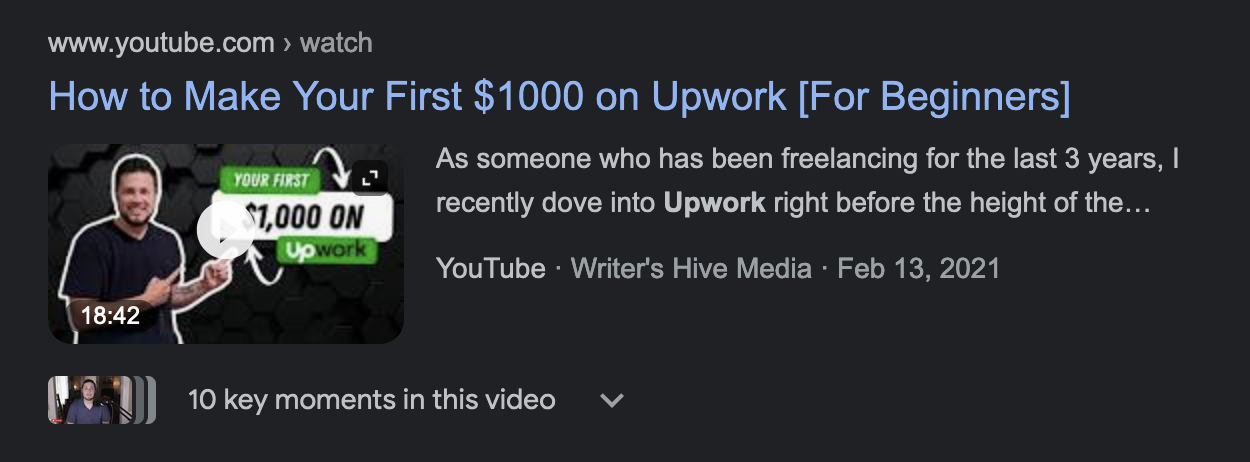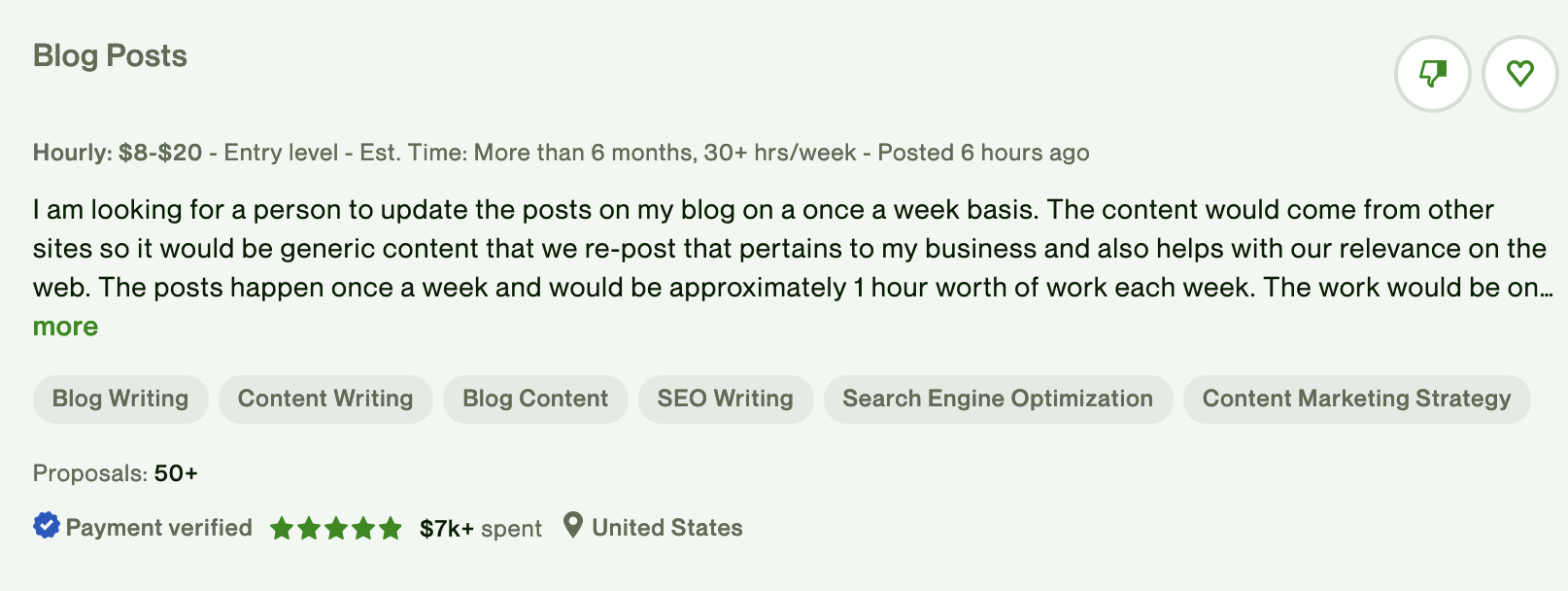Is Upwork Legit? The Thorough Answer for Freelancing Writers
Every freelance writer has watched the YouTube videos of people making six figures a year on Upwork and thought to themselves, “Huh. Is Upwork legit?”
Seems mighty profitable!
I was one of those people. Short answer: Yes, Upwork’s a real platform for freelancers. It’s not a scam. But it’s not the best solution to make money as a freelancer, for reasons I’ll discuss below.
Let’s get into everything you need to know about Upwork, and how you can tell if it’s right for you.
What is Upwork?
Upwork is a freelance platform. As a client, you can upload jobs you want freelancers to do. I used Upwork to design a logo for my website, for example. As a worker, you can bid on those projects.
I know Upwork is legit because it’s a well-established platform with millions of freelancers and 814,000 clients. In 2022, there were $4.1 billion transactions across the platform. It’s been around for decades, and there are plenty of freelancers and companies that use it.
It’s worth noting that Upwork still isn’t profitable – this year, they made a net loss of nearly $90 million. In fact, they’ve never made a profit. Remember this as you scroll down.
How does Upwork work?
In short: join, get tokens, bid on jobs with tokens, win.
In long: For freelancers, Upwork revolves around tokens called Connects that allow you to bid on jobs proposed by clients. Once you’ve created a profile, you’re issued with a certain number of Connect tokens. You use those Connect tokens to bid on jobs. This ranges from two to eight Connects per job, depending on how “big” the job is.
You get 10 new Connect tokens for free every month. You can also buy them for $0.15 per Connect token, or earn them by registering for Upwork (40 Connects), getting a Rising Talent badge (30 Connects), or winning an interview with an established client (30 Connects).
As a freelancer, you can browse Upwork for jobs in your field. For example, I’m a freelance writer. I go to Content Writing. There I can choose between 135 jobs to bid for, including helping someone create a LinkedIn profile, a gig writing weekly blog posts for an asbestos removal company, and drafting a Wikipedia page about a local soccer player.
You can bid on the job using Connects, then you’ll hopefully be chosen for interview and get the job. If you’re unsuccessful, the Connects are gone. If you get the interview and the job, your Connects are refunded.
Once you complete the job, you’ll get a rating and a review from a hopefully happy client.
What fields are on Upwork?
What kind of work can be done remotely? That’s the category of job you’ll see on Upwork. Here are some examples:
Web, mobile & software development.
Graphic design, video production, animation, illustration, and other creative tasks.
Writing, editing, proofreading, translation, and other related tasks.
Sales, marketing, advertising, and public relations.
Data entry, research, email handling, and customer support.
Customer service representatives, technical support, and virtual assistants.
Accounting, bookkeeping, financial analysis, business consulting, and legal services.
Engineering, architecture, and related technical fields.
Data analysis, data science, machine learning, and statistical analysis.
Network administration, system administration, and cybersecurity.
This is just a selection – there are more types of specialties, and tons of subcategories within those Upwork job categories.
Source: Upwork’s article on Job Categories and Descriptions
Upwork vs Fiverr
Upwork is similar to Fiverr, which is another job platform for gig workers. The main differences are:
Fiverr is typically for shorter-term projects
Upwork pays a little better, because the projects are longer-ter,
Fiverr has less screening than Upwork on both the client and the freelancer side.
In short, Upwork is like Fiverr’s big sister.
I’ve talked about whether Fiverr is good for beginner writers before. Short answer, no, longer answer no, because it encourages under-pricing yourself.
How do I know Upwork’s legit?
Aside from the number of users and age of the platform, I know Upwork is legit because Upwork uses a lot of methods to make sure both client and worker are real and verified.
As a client, you can verify your payment method, which results in more freelancers bidding on your gig. As a freelancer, you have the freedom to only bid on clients who have a verified form of payment to avoid wasting your time.
You can also check out a client’s history to see how much money they’ve spent on the platform, how long they’ve been with Upwork, and what reviews they’ve left.
Example of a good-looking, legit Upwork job. This person has spent $7k on the platform, has verified their payment method, and has 5 stars. Great stuff!
How much money can you make on Upwork?
Upwork unhelpfully doesn’t reveal who their top earners are, but we can make some educated guesses. I mean, just for starters, freelance graphic designer Morgan Overholt has made $600,000 over the past five years, averaging easily more than $100,000 per year. Evan Fisher, in a slightly more specialized niche, has earned over $2 million in three years as a pitch deck expert.
Now, I do find it curious that among the many blog posts Upwork has written about freelance rates, they don’t include any of their own data about how much money you can make on Upwork.
The only one I could find with real numbers doesn’t cite Upwork’s own internal trove of data, which must be vast, but instead cites CNBC and “additional research data.”
Why? Because the vast majority of freelancers on Upwork make very little. External research from EBiz Facts suggests that a tiny, tiny proportion of Upwork freelancers even make $1000/month. That’s a good number, but not many people can afford to live on $12,000/year.
The truth? Upwork is a good way to make money, but not a good way to make a lot of money. Out of 800 freelancers, only one on average earns at least $1,000 per month.
Pros of Upwork
There are two main pros of Upwork.
It’s very easy to get started.
You can create a profile, set out your credentials, and bid on jobs within minutes. It’s a little bit pay-to-play, since you have to buy Connects in order to bid on jobs.
But as long as you focus on bids where you stand a good chance or winning, or you don’t mind paying a cup of coffee’s worth amount of money to refill your Connects, it’s fine.
You can monetize almost any skill.
Now, I found Fiverr to offer a wider range of potential services. But Upwork has hundreds of subcategories. Granted, most successful freelancers on Upwork can either code or sell. But you can still make some cash with almost any skill.
Cons of Upwork
There are definitely some downsides of Upwork, even if it is a real business. Here are the main things to keep in mind.
Scams do exist
While researching this piece, I was surprised to learn that while Upworth is legitimate, some freelancers and clients on the platform aren’t legit at all. They’re scams.
The most popular scams to watch out for are fraudsters pretending to be legitimate Upwork clients, who will ask you to e.g. send money to buy office supplies, promising to reimburse you. Of course, they never do. Others try to contact you outside of Upwork. You get the job, you do the work, and never get paid.
I also saw a job posting that wanted you to do various Google searches, click on links, and spend time on those articles. This felt like an SEO scam – not a real job posting, just trying to get some SEO juice. You won’t lose money, but it’s a waste of time.
Competition is steep
You’re competing with millions of other freelancers, many of whom can do what you do better, and charge less for it. Or they can write a better profile or pitch than you can.
This has the effect of forcing prices down. I see so many talented freelancers on Upwork bidding for ludicrously low-priced pitches just to get their first client.
Remember, there’s a reason Upwork doesn’t shout about how much its freelancers earn, as I mentioned above. And that’s because they don’t earn very much.
10% fee
Upwork also takes a 10% fee of anything you earn, which is hefty. They also limit communication between you and the client, to force you to stay on the site and keep paying Upwork for gigs instead of communicating directly.
Upwork’s updated fee structure
Upwork’s business model is frustrating
Small rant incoming. You’ve been warned.
What I found most damning was Upwork’s Quarterly Earnings Report. If you read it, who do you think they’re talking to? Who are they pitching?
Look at this. This is talking to COMPANIES, not freelancers. That’s their customer. We’re the product.
They’re not courting freelancers. They’re courting businesses. I find this particularly egregious because most of their money comes from freelancers, not businesses. Freelancers pay for Connect tokens, and freelancers give up 10% of their earnings to Upwork. While businesses do pay some fees, and additionally pay for access to top talent, according to Upwork’s 2020 earnings report, 76% of Upwork’s revenue comes from the fees they charge freelancers.
So here’s how Upwork REALLY works. They charge you a fee to pitch, they charge you a fee if you win. And yet all their marketing material is aimed at companies. There’s no mistake. You, as a freelancer, are Upwork’s product, not the customer.
I’m on my soapbox a bit now, but in my opinion, Upwork is a meta platform. They don’t do anything; they don’t provide anything of value. All they do is squat on the chokepoint between businesses and individuals and squeeze cash out of both parties — mostly out of freelancers.
After all, if they really provided a value, they wouldn’t be afraid of freelancers and clients speaking directly to each other through Upwork. But they are – in fact, they list it as a primary revenue concern. Their profitability relies on you not talking to companies directly.
In my opinion, you’re better off browsing LinkedIn, Twitter, or even job boards like Indeed for look for freelance gigs. Reach out to companies directly and pitch yourself on your own terms. At least that way you’re master of your own fate, instead of being subject to people who think freelancer should be spelled “feelancer.”
So in summary, the cons of Upwork are that most freelancers don’t earn anything, they take a big percentage of your fees, and it can be tricky to communicate with clients since Upwork is so keen on keeping a wall between you and the client.
Final thoughts on whether Upwork is a good idea
I accidentally broke into a little rant there, sorry about that. I’m very passionate about ensuring that freelancers get paid what they’re worth. While Upwork is legit – that is to say, Upwork is not a scam, it’s a real way to earn money by doing freelance jobs – it’s not the best method out there of earning money as a freelancer.
Instead, I recommend:
Starting and running your own blog.
Choosing sites like Textbroker, Scripted, or Copify, which are harder to get accepted into but have a good, well-paid client base.
Blogging on Medium.
Applying on places like WeWorkRemotely.
Directly contacting companies and pitching yourself.
That’s the best way to get paid what you’re worth.











